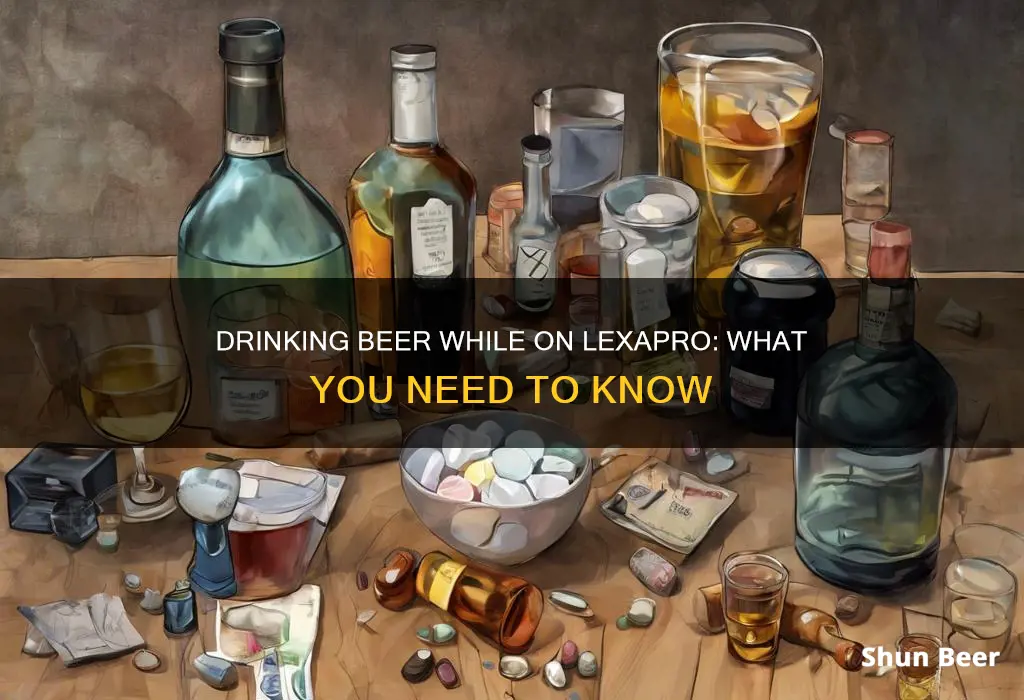
Lexapro, a brand name for the drug escitalopram, is a selective serotonin reuptake inhibitor (SSRI) commonly prescribed to treat depression and anxiety. While it is considered one of the safest types of antidepressants, it is generally not recommended to consume alcohol while taking Lexapro due to the potential risks and side effects.
| Characteristics | Values |
|---|---|
| Should I drink beer with Lexapro? | Doctors advise against drinking alcohol while taking Lexapro. |
| Why is it not recommended? | Alcohol can worsen symptoms of depression and anxiety, and can increase the side effects of Lexapro. |
| What are the side effects of Lexapro? | Dizziness, drowsiness, weakness, feeling shaky or anxious, sleep problems (insomnia). |
| What are the side effects of mixing Lexapro and alcohol? | Increased drowsiness, dizziness, confusion, agitation, loss of control, poor coordination, gait problems, dehydration, headaches, fatigue, nausea, reduced alertness, and serotonin syndrome. |
| What are the risks of mixing Lexapro and alcohol? | Increased risk of overdose, injury, alcohol dependence, and suicidal thoughts or tendencies. |
What You'll Learn

Lexapro and alcohol side effects
Lexapro (escitalopram) is a selective serotonin reuptake inhibitor (SSRI) commonly prescribed to treat depression and anxiety. While Lexapro is considered one of the safest types of antidepressants, it can still cause side effects, which may vary from person to person.
Drinking alcohol while taking Lexapro is generally not recommended by healthcare professionals. This is because alcohol can intensify and add to the side effects of Lexapro, and it can also reduce the effectiveness of the medication.
The combination of Lexapro and alcohol can lead to a range of side effects, including:
- Increased drowsiness and dizziness: Alcohol has a sedative effect on the body, which, when combined with Lexapro, can result in heightened drowsiness and dizziness.
- Poor coordination and gait problems: The mixture of alcohol and Lexapro can impair judgment and coordination, increasing the risk of accidents and injuries.
- Agitation and loss of control: Alcohol can interact with Lexapro, leading to increased agitation and a reduced ability to control emotions and behaviour.
- Increased risk of depression and anxiety: Alcohol is a depressant and can worsen symptoms of depression and anxiety. This is especially true when combined with Lexapro, as it can reduce the medication's effectiveness in treating these conditions.
- Heightened risk of suicidal thoughts and tendencies: The interaction between alcohol and Lexapro can increase the risk of developing suicidal thoughts and tendencies.
- Serotonin syndrome: Alcohol temporarily boosts serotonin levels in the brain. When combined with Lexapro, which also affects serotonin, there is a risk of developing serotonin syndrome, characterised by rapid changes in blood pressure or heartbeat.
- Dehydration and hangover-like symptoms: The combination of alcohol and Lexapro can cause dehydration, leading to symptoms such as headaches, fatigue, and nausea, even after consuming a small amount of alcohol.
- Increased alcohol dependence: Research suggests that drinking alcohol while taking SSRIs like Lexapro may lead to an increased risk of alcohol dependence.
- Overdose: Mixing alcohol with Lexapro increases the risk of overdose, which can have fatal consequences.
It is important to note that these side effects may vary among individuals, and not everyone will experience all of them. However, due to the potential risks and negative interactions, it is generally advised to avoid drinking alcohol while taking Lexapro.
If you are taking Lexapro and considering consuming alcohol, it is crucial to consult your doctor first. They can provide personalised advice based on your medical history and current condition.
Antibiotics and Alcohol: A Risky Mix?
You may want to see also

Doctors' recommendations
Lexapro (escitalopram) is a selective serotonin reuptake inhibitor (SSRI) commonly prescribed to treat depression and anxiety. While Lexapro is considered one of the safest types of antidepressants, drinking alcohol while taking this medication is generally not recommended by doctors. This is because alcohol can worsen symptoms of depression and counteract the benefits of the medication.
- Doctors advise against drinking alcohol while taking Lexapro. The combination can lead to increased side effects, such as drowsiness, dizziness, and confusion. It can also increase the risk of developing suicidal thoughts or tendencies.
- Even small amounts of alcohol can have a significant impact when mixed with Lexapro. Therefore, it is not recommended to consume any alcohol while taking this medication.
- If you decide to drink alcohol while on Lexapro, closely monitor yourself for adverse reactions. Be vigilant for signs of increased depression or suicidal thoughts. Contact your healthcare provider immediately if any unusual symptoms occur.
- The combination of Lexapro and alcohol increases the risk of injury due to impaired judgment and coordination. It can also negatively interact with other medications you may be taking.
- Alcohol can cause dehydration and hangover-like symptoms when mixed with Lexapro, even after consuming a small amount.
- Long-term alcohol use can worsen depression and lead to a decrease in serotonin levels, counteracting the effects of Lexapro.
- People with depression are at a higher risk of developing alcohol use disorder. Mixing alcohol with Lexapro can further increase the risk of alcohol dependence.
- If you are considering drinking alcohol while on Lexapro, consult your doctor first. They can provide personalized advice based on your medical history and current condition.
- Some doctors may consider it acceptable to drink moderately while taking Lexapro if you are at low risk for alcohol misuse. "Moderate drinking" typically means no more than two drinks per day for men and one drink per day for women.
- Before drinking any alcohol, ensure you have taken Lexapro long enough to understand its effects on you and any side effects you may experience.
- If you decide to drink, do so slowly and always with food to minimise the potential negative consequences.
Drinking Beer in Spain: What's Allowed in Public?
You may want to see also

Alcohol's effect on depression
Lexapro (escitalopram) is a Selective Serotonin Reuptake Inhibitor (SSRI) commonly prescribed to treat depression and anxiety. While Lexapro is considered one of the safest types of antidepressants, drinking alcohol while taking it is generally not recommended by doctors. This is because alcohol can worsen symptoms of depression and reduce the effectiveness of the medication.
Alcohol is a depressant that alters the delicate balance of chemicals in the brain. Drinking heavily and regularly is associated with depression. Alcohol slows down processes in the brain and central nervous system, initially making you feel more relaxed and less inhibited. However, these effects wear off quickly, and drinking more to regain the feeling can lead to alcohol dependence.
Research has shown a bidirectional relationship between alcohol use disorder (AUD) and depressive disorders. Both disorders can exist together, and each disorder increases the risk for the other. Alcohol can not only lead to depressive symptoms but also worsen existing symptoms. Additionally, alcohol use disorders are more prevalent among people with depression than in the general population.
Drinking alcohol can interfere with recovery from depression. Studies have found that depressed individuals who are heavy drinkers display worse outcomes from depression treatment. Even mild to moderate amounts of alcohol can worsen depression, and depressed patients who drink low levels of alcohol experience worse outcomes from pharmacological treatments.
Lexapro and Alcohol
Combining Lexapro and alcohol is not recommended as it can lead to more side effects than taking Lexapro alone. Together, they can cause feelings of drowsiness, dizziness, and decreased mental sharpness and alertness. In extreme cases, the combination can lead to violent behaviour.
Alcohol can reduce the effectiveness of Lexapro, making your anxiety or depression worse. Additionally, since alcohol can cause or worsen depression, mixing it with Lexapro may have the opposite effect of what you intended. It can also increase the risk of suicidal thoughts and make it harder to treat your depression.
If you are taking Lexapro and want to drink alcohol, it is essential to consult your doctor first. Some doctors may advise moderate drinking, which means one drink per day for women and two drinks per day for men. However, it is crucial to understand the risks involved and follow your doctor's advice.
Beer as Petrol: Can You Really Run on Hops?
You may want to see also

Safe alcohol consumption with Lexapro
Lexapro (escitalopram) is a commonly prescribed brand of antidepressant used to treat depression and anxiety. It belongs to a class of drugs known as selective serotonin reuptake inhibitors (SSRIs), which work by increasing serotonin levels in the brain, improving mood and reducing anxiety symptoms.
While Lexapro is considered one of the safest types of antidepressants, drinking alcohol while taking it is generally not recommended by doctors and healthcare professionals. This is because alcohol can worsen the side effects of Lexapro and reduce its effectiveness.
Side Effects and Risks of Mixing Lexapro and Alcohol
The combination of Lexapro and alcohol can lead to a range of side effects, including:
- Increased drowsiness and dizziness
- Poor coordination and gait problems
- Agitation and loss of control
- Heightened symptoms of depression and anxiety
- Increased risk of injury due to impaired judgment and coordination
- Dehydration and hangover-like symptoms, such as headaches, fatigue, and nausea
- Increased risk of developing suicidal thoughts or tendencies
- Serotonin syndrome, characterised by rapid changes in blood pressure or heartbeat
- Overdose, which can have fatal consequences
Safe Consumption Guidelines
If you are taking Lexapro and considering consuming alcohol, it is crucial to consult your doctor first. They will provide personalised advice based on your medical history and current condition.
For individuals at low risk of alcohol misuse, it may be safe to consume a small amount of alcohol occasionally while taking Lexapro. According to general guidelines, moderate drinking is defined as up to two drinks per day for men and one drink per day for women. One drink is equivalent to:
- 12 ounces (355 ml) of 5% alcohol by volume (ABV) beer
- 5 ounces (148 ml) of 12% ABV wine
- 1.5 ounces (44 ml) of 40% ABV liquor
To minimise the potential side effects, it is recommended to drink slowly and consume alcohol with food. Additionally, it is important to be aware of the potential for alcohol to interact negatively with other medications you may be taking.
Alternative Coping Strategies
Instead of relying on alcohol as a coping mechanism, it is advisable to explore healthier alternatives. Some suggestions include:
- Talking to friends or family members for support
- Engaging in physical exercise or working out
- Practising meditation or other relaxation techniques
- Adopting a healthy diet and improving sleep habits
Beer and Doxycycline: Is It Safe to Mix?
You may want to see also

Lexapro and alcohol overdose
Lexapro (Escitalopram) is a brand of antidepressant used to treat depression and anxiety. It is part of the Selective Serotonin Reuptake Inhibitors (SSRI) family, which helps restore serotonin deficiencies. Serotonin is a neurotransmitter that partially regulates emotions. While Lexapro is considered one of the safest classes of antidepressants, there are risks associated with its usage.
The combination of Lexapro and alcohol is strongly discouraged due to potentially dangerous side effects. Even a small amount of alcohol can lead to a host of unpleasant effects. The negative side effects become more severe with each drink. Mixing these two substances may lead to heightened symptoms of depression and anxiety.
The medication helps to block severe symptoms of anxiety or depression, allowing individuals to function normally in everyday life. However, consuming alcohol while on Lexapro decreases the medication's effectiveness, which can worsen anxiety or depression.
The side effects of Lexapro include drowsiness, dry mouth, and constipation. When combined with alcohol, additional side effects may occur, such as:
- Worsening depression
- Decreased effectiveness of medication
- Liver damage due to increased alcohol consumption over time
- Increased risk of suicidal thoughts and behaviour
- Dizziness
- Aggressive or violent behaviour
- Difficulty performing tasks requiring alertness and sharpness
- Insomnia or restlessness
- Increased worries and irritability
- Feelings of worthlessness and loss of interest in activities
It is crucial to consult a doctor before consuming alcohol while taking Lexapro or any other antidepressant. They can provide personalised advice and guidance based on an individual's situation and risk factors.
Beer and Atkins: What You Need to Know
You may want to see also
Frequently asked questions
It is not recommended to drink alcohol while taking Lexapro, as it may increase the risk of severe side effects such as drowsiness, dizziness, and confusion. Mixing alcohol with Lexapro can also lead to dehydration, which may result in hangover-like symptoms such as headaches, fatigue, and nausea.
The side effects of drinking alcohol while taking Lexapro can include increased drowsiness, dizziness, confusion, and a heightened risk of injury due to impaired judgment and coordination. Additionally, drinking alcohol while taking Lexapro can increase the risk of developing suicidal thoughts or tendencies.
It is generally recommended to avoid drinking any alcohol while taking Lexapro. However, some people choose to consume alcohol occasionally while taking the medication. It is crucial to discuss this with your doctor before making any decisions, as they can provide personalized advice based on your medical history and current condition.







